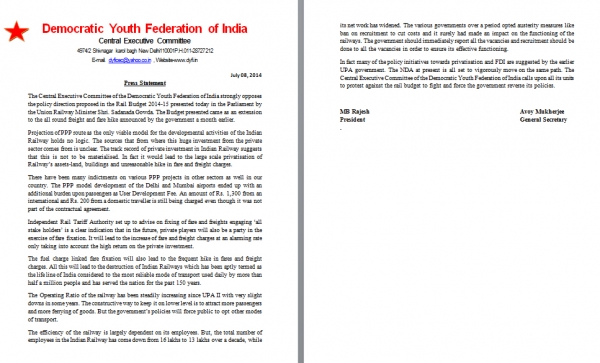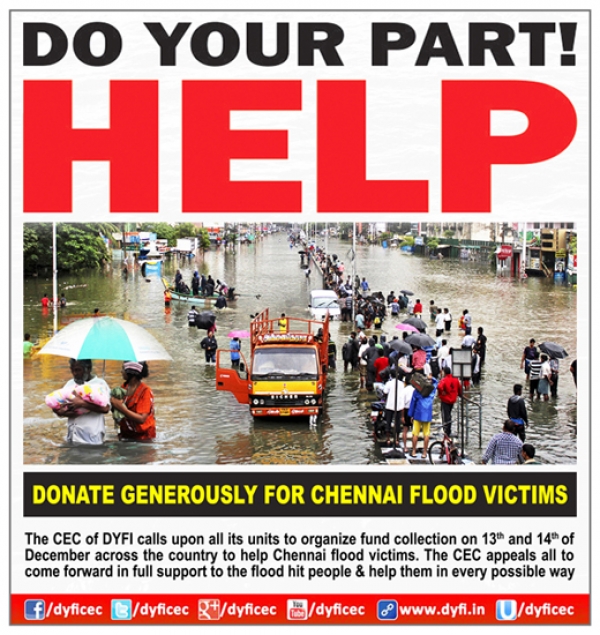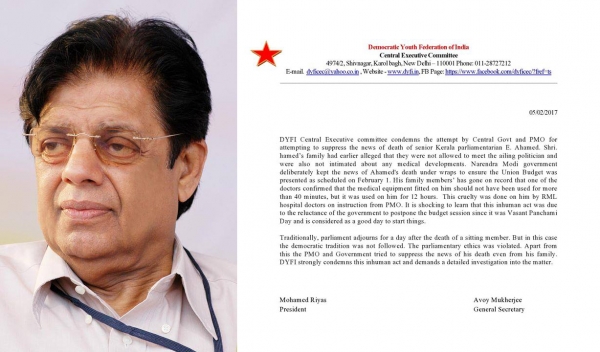DYFI CEC strongly opposes the policy direction proposed in the Rail Budget 2014-15
The Central Executive Committee of the Democratic Youth Federation of India strongly opposes the policy direction proposed in the Rail Budget 2014-15 presented today in the Parliament by the Union Railway Minister.
The Budget presented came as an extension to the all round freight and fare hike announced by the government a month earlier. Projection of PPP route as the only viable model for the developmental activities of the Indian Railway holds no logic. The sources that from where this huge investment from the private sector comes from is unclear. The track record of private investment in Indian Railway suggests that this is not to be materialised. In fact it would lead to the large scale privatisation of Railway’s assets-land, buildings and unreasonable hike in fare and freight charges.
There have been many indictments on various PPP projects in other sectors as well in our country. The PPP model development of the Delhi and Mumbai airports ended up with an additional burden upon passengers as User Development Fee. An amount of Rs. 1,300 from an international and Rs. 200 from a domestic traveller is still being charged even though it was not part of the contractual agreement.
Independent Rail Tariff Authority set up to advise on fixing of fare and freights engaging ‘all stake holders’ is a clear indication that in the future, private players will also be a party in the exercise of fare fixation. It will lead to the increase of fare and freight charges at an alarming rate only taking into account the high return on the private investment.
The fuel charge linked fare fixation will also lead to the frequent hike in fares and freight charges. All this will lead to the destruction of Indian Railways which has been aptly termed as the life line of India considered to the most reliable mode of transport used daily by more than half a million people and has served the nation for the past 150 years.
The Operating Ratio of the railway has been steadily increasing since UPA II with very slight downs in some years. The constructive way to keep it on lower level is to attract more passengers and more ferrying of goods. But the government’s policies will force public to opt other modes of transport.
The efficiency of the railway is largely dependent on its employees. But, the total number of employees in the Indian Railway has come down from 16 lakhs to 13 lakhs over a decade, while its net work has widened. The various governments over a period opted austerity measures like ban on recruitment to cut costs and it surely had made an impact on the functioning of the railways. The government should immediately report all the vacancies and recruitment should be done to all the vacancies in order to ensure its effective functioning.
In fact many of the policy initiatives towards privatisation and FDI are suggested by the earlier UPA government. The NDA at present is all set to vigorously move on the same path. The Central Executive Committee of the Democratic Youth Federation of India calls upon all its units to protest against the rail budget to fight and force the government reverse its policies.




 Central Executive Committee
Central Executive Committee









Comments on Post (4)
Mason Gray
Many communities in the disease zones have inadequate sanitation that allow frequent trash piles and open sewers to serve as mosquito breeding and feeding grounds, according to the final outcome statement from the Aedes aegypti summit last month.
Johny Elite
Lorem ipsum dolor sit amet, consectetur adipiscing elit. Nam viverra euismod odio, gravida pellentesque urna varius vitae, gravida pellentesque urna varius vitae.
Rog Kelly
Lorem ipsum dolor sit amet, consectetur adipiscing elit. Nam viverra euismod odio, gravida pellentesque urna varius vitae, gravida pellentesque urna varius vitae.
James Warson
Many communities in the disease zones have inadequate sanitation that allow frequent trash piles and open sewers to serve as mosquito breeding and feeding grounds.